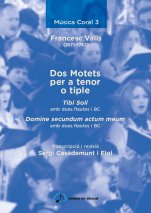Contents
FRANCESC VALLS was born in Barcelona in 1671 (1). He was named Mestre de Capella (Chapel Choirmaster) at the Santa Maria del Mar Church in 1696 and at the end of the year he moved on to take up the same role on a permanent basis at Barcelona Cathedral. He retired in 1726 after 30 years of service and passed away in Barcelona in 1747.
Francesc Valls is considered to be a key composer of Catalan music in the Baroque style both for the important work he did in Barcelona as well as for his intellectual freedom which led him to develop an interest in the music being written around Europe. In his treatise on harmonic theory Mapa armónico práctico (2) he explains what French, German and Italian composers were doing at that time, highlighting the Italians’ style. Despite this praise, he did not agree with using the Italian theatre style in religious compositions as he points out in his treatise: “The Italians exceed at showing good taste in music and their style of Theatrical Music, which embellishes the effects around the verses whether they be joyful, sad, playful or lively, as well as the connection of instruments decorating the composition. This is admirable in the theatre, but in a church, as has been said many times, it would be inappropriate.”
Almost all Valls’ work is religious except for a few cantatas and the secular pieces known as tonos humanos and we are left wondering what kind of music he would have written for the theatre. He studied in a structured scholastic style, and when he discovered Italian music at first hand due to the Spanish War of Succession in the early eighteenth century, he was able to evolve in his musical compositions, while maintaining tradition, to levels similar to those achieved by German composers who assimilated the Italian influence without losing their counterpoint heritage.
These motets were composed with this new aesthetics. Three of them can be found in the Mapa armónico práctico treatise, while another three come from a manuscript from the period of the confiscation of convents and monasteries in Spain and are now conserved in the University of Barcelona. Finally, there are six pieces from the archives of Barcelona Cathedral stored at the National Library of Catalonia.
We have recorded several of these pieces with the Guillamí Consort group for the album Francesc Valls i la música de l’Arxiduc Carles published by La Mà de Guido.
We hope that by publishing this selection of motets, we will help more musicians get to know them and play them.
Sergi Casademunt i Fiol











